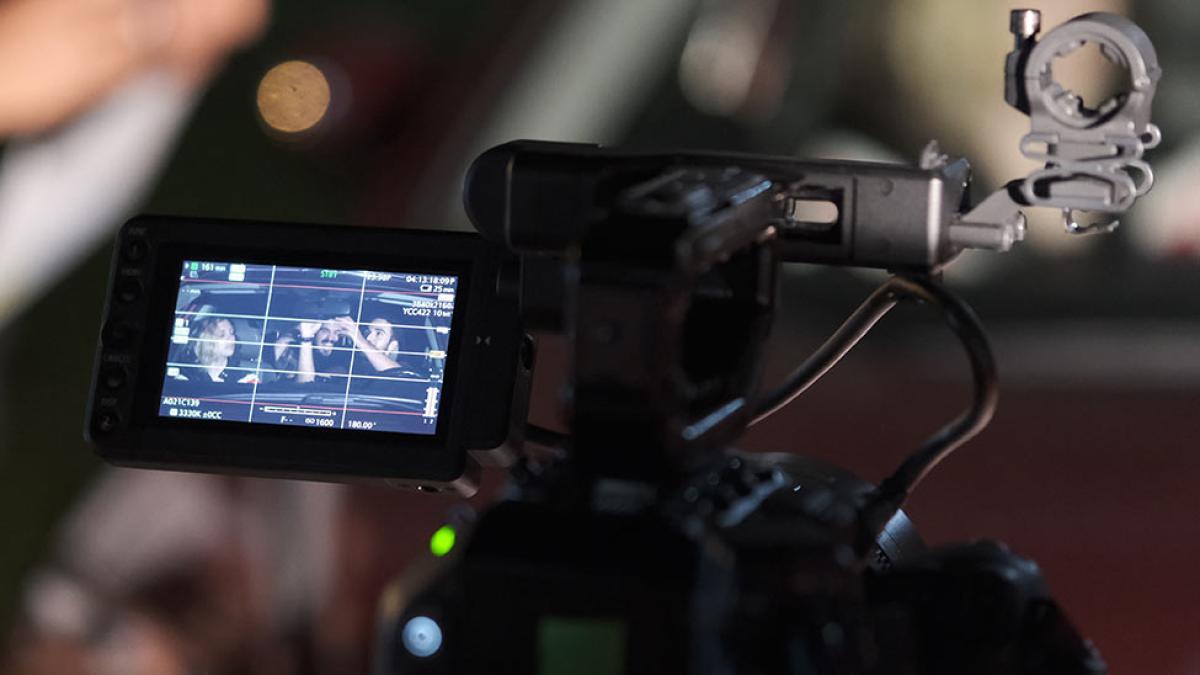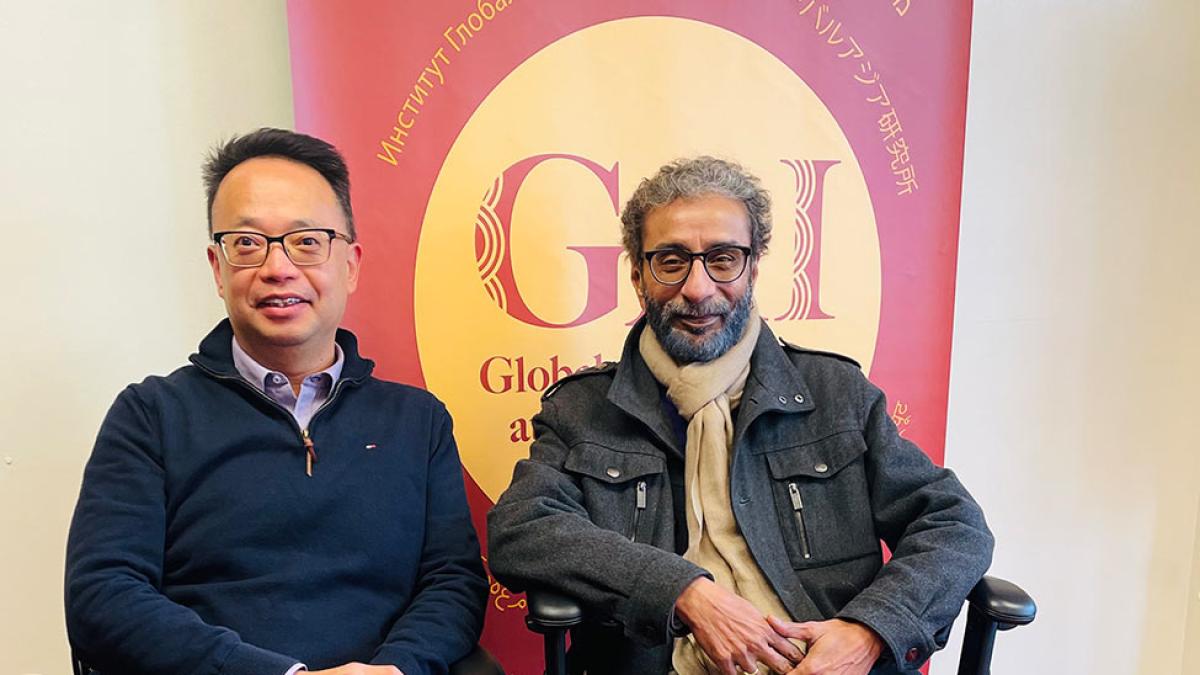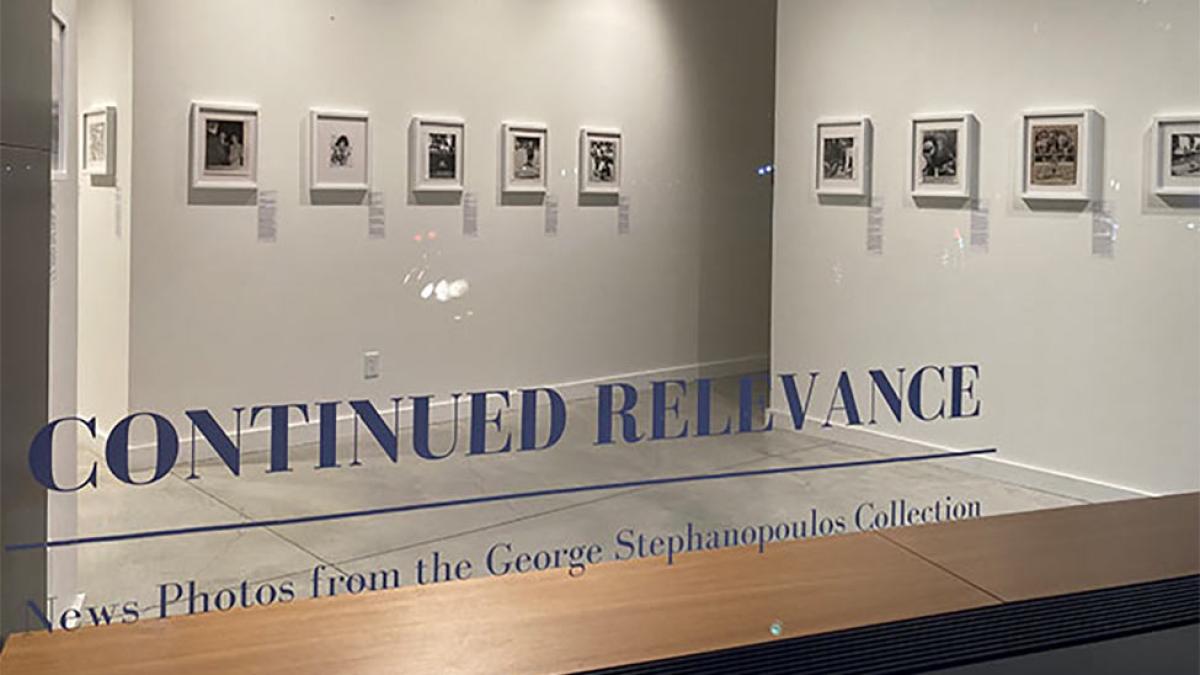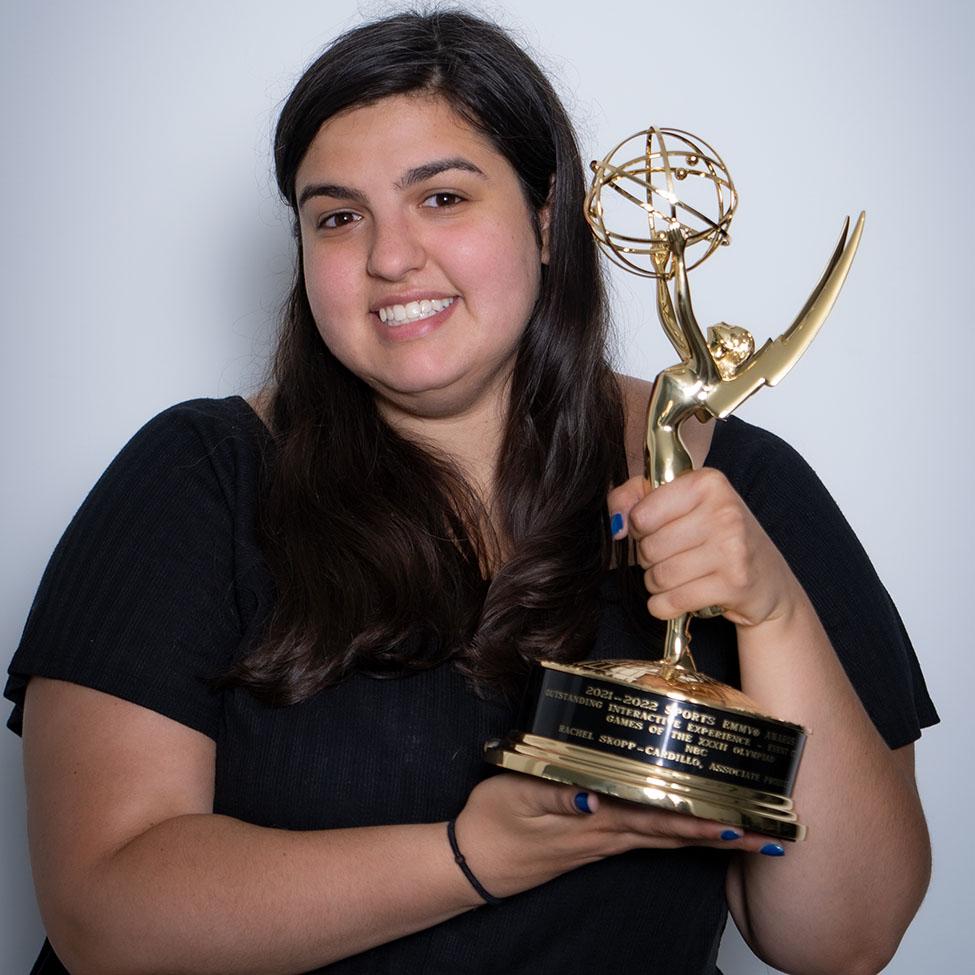
The Emmy Winner: Rachel Skopp-Cardillo '20
Emmy Award-winning producer and third-generation alumna Rachel Skopp-Cardillo’s success is deeply rooted at Pace.
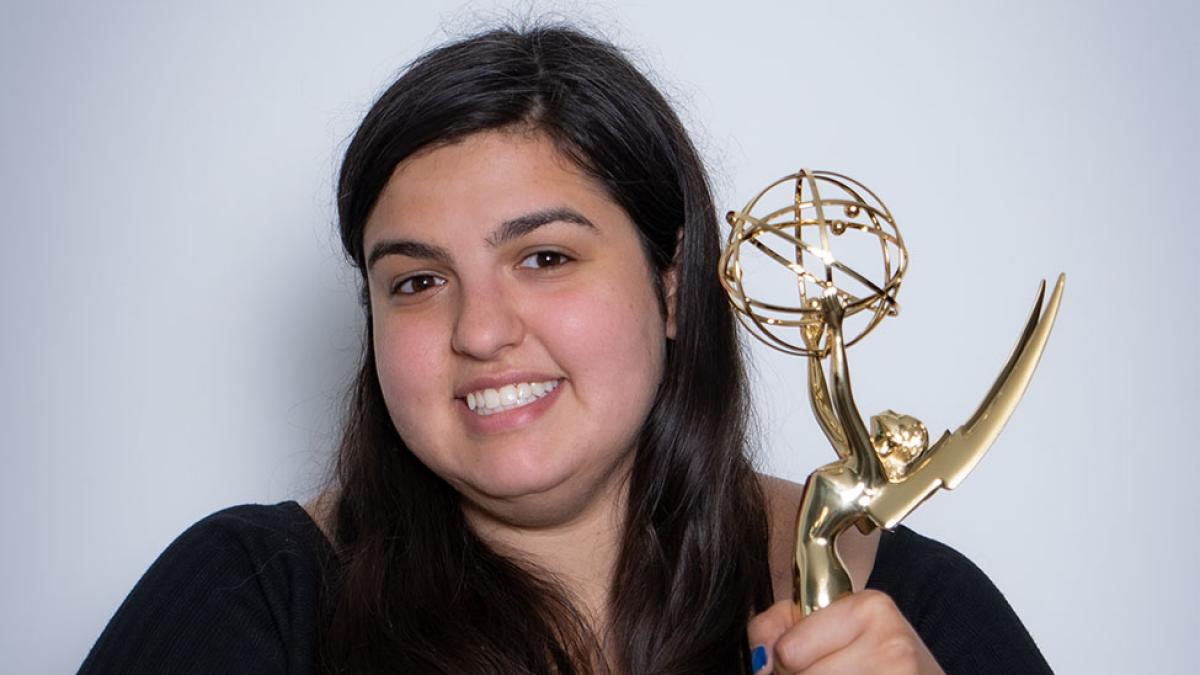
Emmy Award-Winning Producer and Third-Generation Alumna Rachel Skopp-Cardillo’s Success is Deeply Rooted at Pace

You are a coordinator for field scheduling at NBC Sports, and recently, an Emmy-award winning associate producer for your work on the Tokyo 2020 Olympics. Tell us how it felt to be recognized for this extraordinary achievement so early in your career.
I've always wanted to work with the Olympics and my family is very involved in sports. My father is a sports chiropractor, and my mother is a documentarian, who did documentaries about Olympic Swimming Trials and races across the Sahara Desert. She has three Emmys of her own, also for her work as a senior producer, so I’ve always known that I’ve wanted one and dreamed of having one with my own name on it. At a friend’s graduation party in high school, I was voted most likely to win an Emmy. Funny enough, I didn’t even know that I was nominated, but found out the following day when the press release came out and I searched my name. I screamed and ran all over my apartment. I first called my mom, saying “I think I am crying!” Then, I called my favorite Pace professor, Professor Maria Luskay!
Can you describe the work you did at NBC Sports that led to your Emmy win?
I worked in the Highlights Factory, which is something I will never forget. It's a huge room filled with shot selectors, production assistants, editors, producers, and directors. The operation ran 24/7, and it publishes highlights, compilations, interviews, and inspiring stories on NBC's YouTube channel and official website. So much footage was coming in, and, with the help of the shot selectors, it was my job to pick the best and share them with the producers and editors. I also directed the Blackmagic ISO [a type of camera] feeds of the Swimming competition all the way from Tokyo. It was a little stressful because the shot selected is on the feed forever. Once I got the hang of it, though, it was quite fun!
“Working on a Pace Docs documentary is one of the best ways to experience hands-on learning outside of the classroom at Pace. I was able to thrive as a filmmaker and gain confidence in knowing that this is what I am supposed to be doing with my life.”
You graduated with a Bachelor of Science in Digital Cinema and Filmmaking on the Pleasantville campus. What attracted you to pursue this course of study?
I have Attention-deficit/Hyperactivity Disorder (ADHD), dyslexia, and dysgraphia [a neurological disorder characterized by writing disabilities], so it's really hard for me to write things down and to tell stories verbally. Instead, I feel like I can shine more visually. I love all aspects of production: pre-production, production, and post-production. It just felt natural to me.
How has your degree prepared you for your career and how did you get started? What internships did you have or other activities did you participate in on campus?
Professor Luskay and Professor Lou Guarneri's Producing a Documentary class influenced me so much. I learned all about teamwork and hard work through the making of two documentaries, Puerto Rico: Hope in the Dark (2018) and Hawaii: Living on the Edge in Paradise? (2019). Working on a Pace Docs documentary is one of the best ways to experience hands-on learning outside of the classroom at Pace. With roles as first assistant director and colorist, I was able to thrive as a filmmaker and gain confidence in knowing that this is what I am supposed to be doing with my life.
Also, the video editing classes I took with Professor La Rosa helped me become familiar with the Avid Media Composer editing system which I use daily at NBC, and Professor Luskay’s class really helped me with all of the planning aspects of my current role at NBC Sports as a coordinator in the scheduling department.
I had two internships as a student. The first was as a post-production intern with Creative Chaos, in which I assisted producers and editors with their footage needs. The second was as an engagement intern at American Documentary, an opportunity I received with the help of both President Krislov and Professor Luskay. In that role, I assisted in developing educational materials for teachers and students in grades 8-12 on the Season 32 documentaries airing on PBS for POV.
Why did you choose to enroll at Pace University?
It just felt like home. I came from a high school with a very small graduating class, so Pace was big enough for me and yet small enough that I could thrive. I am also a third generation Pace student. My grandmother, Irene Maruzella Cardillo, graduated from [then known as] Good Counsel College in 1951 in White Plains with a degree in Chemistry. My mother, Lauren Cardillo, graduated from the Pleasantville campus in 1980 with a degree in Literature and Communications, and also gave the commencement speech at her graduation.
What projects or goals do you have for the future?
My goals are to work the next Olympics and the Paralympics in Paris in 2024, whether through my office in Stamford, Connecticut or by actually going to Paris. To prepare for this possibility, I’ve been taking Duolingo lessons for French every day since June of 2022.
What advice would you give to our students as they navigate their college life?
If you're looking for an internship or you're looking to connect with other professionals in your area of interest, join a Facebook group or find a list serve that will help you with job listings. Also, go on every interview you are offered. You never know where it might lead.
More Dyson Digital Digest Stories
From professional quality documentary production to in-the-field athletics coverage, students in the Media, Communications, and Visual Arts department on the Westchester Campus are gaining valuable experience.
Associate Professor Satish Kolluri, PhD, and Professor Joseph Lee, PhD, challenge students to explore complex themes of family, love, art, culture, and politics through Hong Kong and Bollywood cinema.
This fall, Dyson students enrolled in three separate courses had the unique opportunity to curate the exhibit, Continued Relevance: News Photos from the George Stephanopoulos Collection, in the Pace University Art Gallery. The result of this process was a select total of 54 images, each carefully chosen by a student and displayed with their personal commentary, from a gift of more than 1,400 historic news photos from the veteran news analyst and former White House Director of Communications, George Stephanopoulos.
2022 Louis V. Fasulo First Year Moot Court Competition Provides Rich Learning Experience
On Saturday and Sunday, March 19–20, the Elisabeth Haub School of Law at Pace University united for the Louis V. Fasulo First Year Moot Court Competition, held in-person for the first time since 2019. The 2022 Louis V. Fasulo First Year Moot Court Competition is the Advocacy Program's principal source for recruiting outstanding advocates for Haub Law’s highly competitive Moot Court Program. The Competition was named after Professor Louis V. Fasulo, Director of Advocacy Programs, for his long and outstanding work with the program.
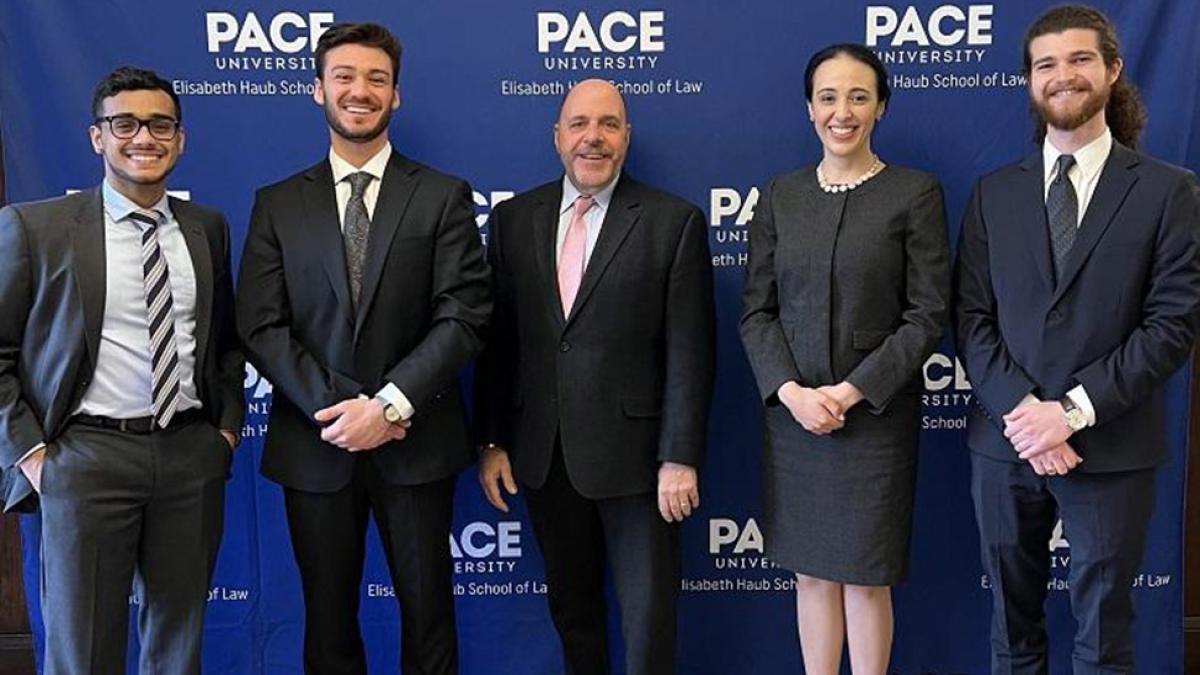
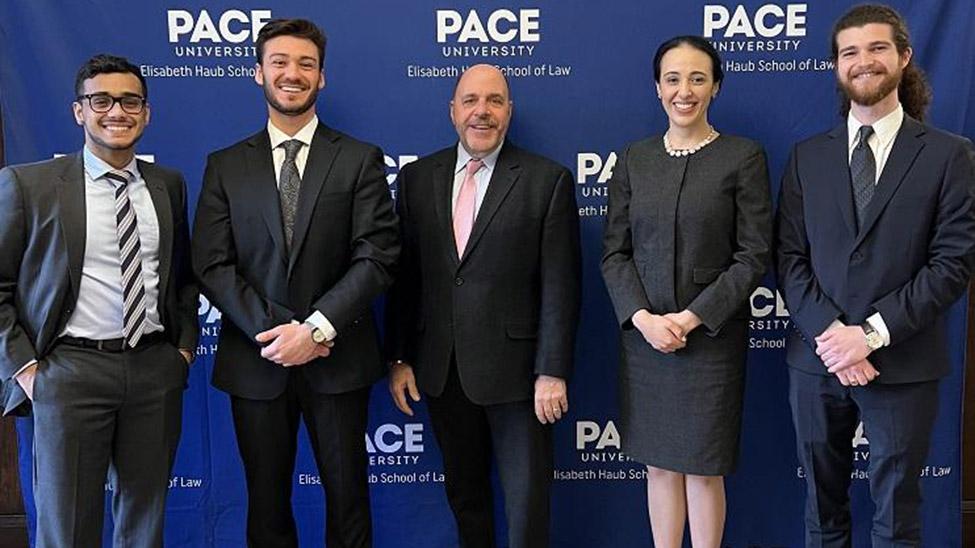
On Saturday and Sunday, March 19–20, the Elisabeth Haub School of Law at Pace University united for the Louis V. Fasulo First Year Moot Court Competition, held in-person for the first time since 2019. The 2022 Louis V. Fasulo First Year Moot Court Competition is the Advocacy Program's principal source for recruiting outstanding advocates for Haub Law’s highly competitive Moot Court Program. The Competition was named after Professor Louis V. Fasulo, Director of Advocacy Programs, for his long and outstanding work with the program.
Over 270 first year students prepared and presented successful arguments in front of Haub Law Advocacy Board members, attorneys, and alumni. This year’s overall winner of the Competition was Daniel Conte with Charles Caspari placing second. Rounding out the top four were competitors Daniel Reyes and Maggie Yee. All of the 1L competitors put their best foot forward in completing this incredible learning experience, which resulted in a very competitive and exciting competition. The students impressed the judges with their knowledge of the law and their overall professionalism and preparedness. It was clear from the student performances that the Legal Skills Professors worked diligently with their students to perfect the art of advocacy.
Winner of the competition, Daniel Conte, stated, “My classmates and I prepared all semester by researching and writing the appellate brief. As a result, I knew the arguments very well, however, during the competition it was really about being comfortable with speaking to judges and showing them that we knew and understood the arguments and facts of the case perfectly. I had never participated in a competition like this, so I didn’t know what to expect regarding the questions and demeanor of the judges, but as the day went on, my classmates and I felt more comfortable being up at the podium. I certainty did not expect to win, and I am still a bit shocked. It was an eye-opening experience and I look forward to getting involved with more trial and appellate advocacy on campus.”
To prepare for the competition, the Haub Law Advocacy Honor Board pre-mooted over 100 rounds of practice for the 1L students, taking much of that responsibility were the Internal Competitions Directors, Michaela Petersen and Marlene Geerinck who worked tirelessly in administering, coordinating, and overseeing the entire competition weekend. Additionally, the entire Advocacy Board, led by Mattison Stewart, Regina Rubino, Angelo Spedafino, Kye Shah, and Kiefer Campbell exemplified for the 1L students the rich learning environment at the law school and our community. A team effort, there were over 30 volunteers from the Advocacy Program and other organizations who assisted as bailiffs for the competition, set up, organization, and otherwise over the course of the entire weekend. This was in addition to the over 70 attorney and alumni volunteers who served as judges. Additionally, Professors Michelle Simon and Senior Associate Dean for Academic Affairs and Law Operations Jill Gross offered guidance, confidence, and support throughout. Themis Bar Review generously sponsored the Competition providing bar preparation credit to each of the winners.
This year’s Top 4 Finalists are as follows:
- Daniel Conte
- Charles Caspari
- Daniel Reyes
- Maggie Yee
Our Top 8 Competitors:
- Charles Caspari
- Courtney Henf
- Daniel Conte
- Daniel Reyes
- Hannah Atkinson
- Kaila Pugliese
- Lena Constable
- Maggie Yee
Our Top 24 Competitors:
- Amanda Dinkin
- Cady Drell
- Charles Caspari
- Courtney Henf
- Dane Gesang
- Daniel Conte
- Daniel Reyes
- Haleigh Catalano
- Hannah Atkinson
- Kaila Pugliese
- Kim Abrahall
- Laurel Jobe
- Lena Constable
- Maggie Yee
- Marco Del Grosso
- Matthew Mattesi
- Michael Kayal
- Nicholas Lamari
- Peter Cella
- Remila Jasharllari
- Rita Flanagan
- Sabrina Rehfeld
- Sheila Tapia
- Theresa Persico
The Elisabeth Haub School of Law at Pace University’s trial advocacy program is ranked #24 in the nation according to the 2022 U.S. News and World report rankings.
Haub Alumni of the Month: Anthony Desiato '12
Anthony Desiato is a 2012 Haub Law Alumnus, former Director of JD Admissions and current Manager of Assessment and Advising at Haub Law, comic book and superhero aficionado, filmmaker, podcaster, husband, father, and more.
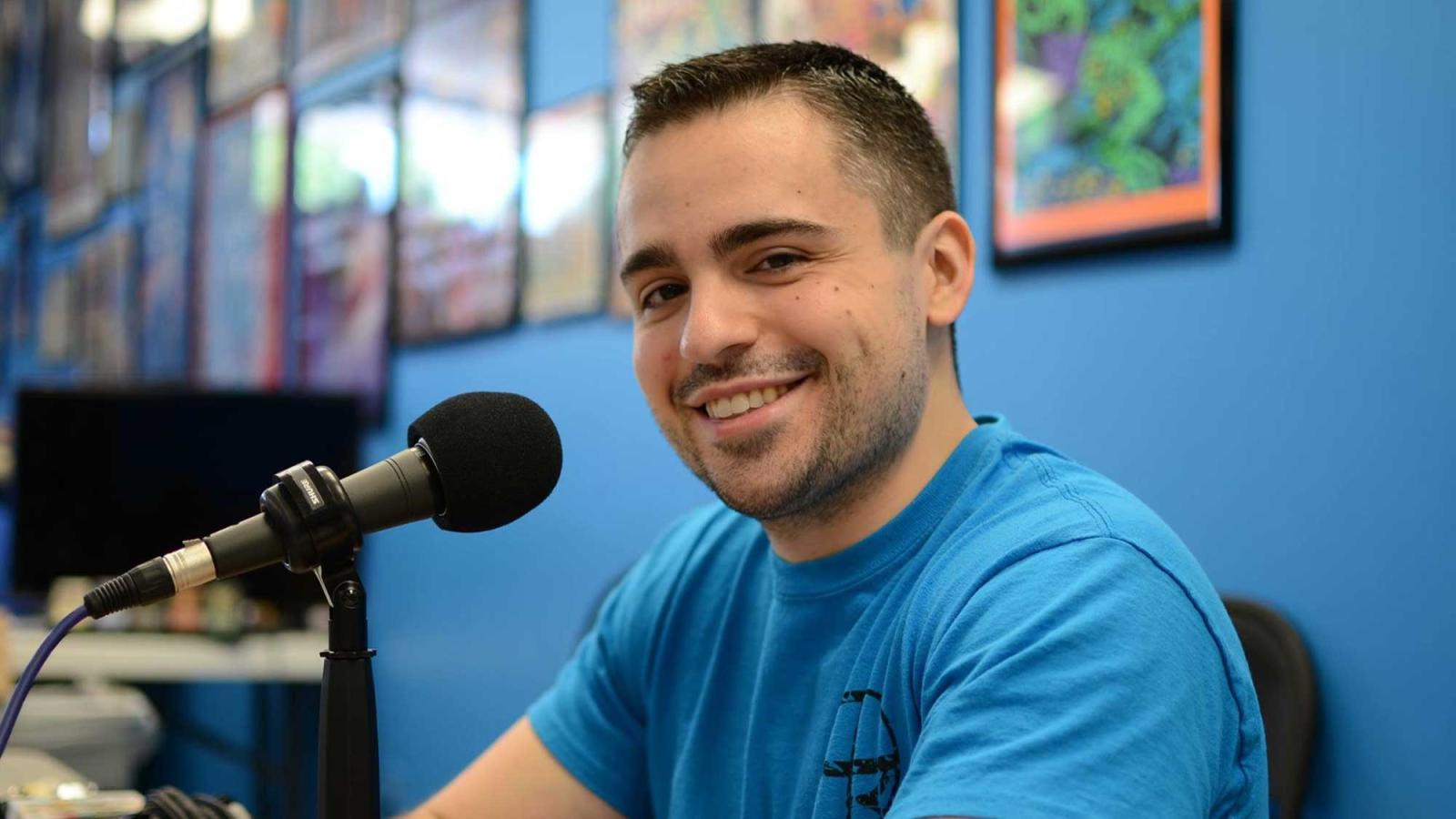
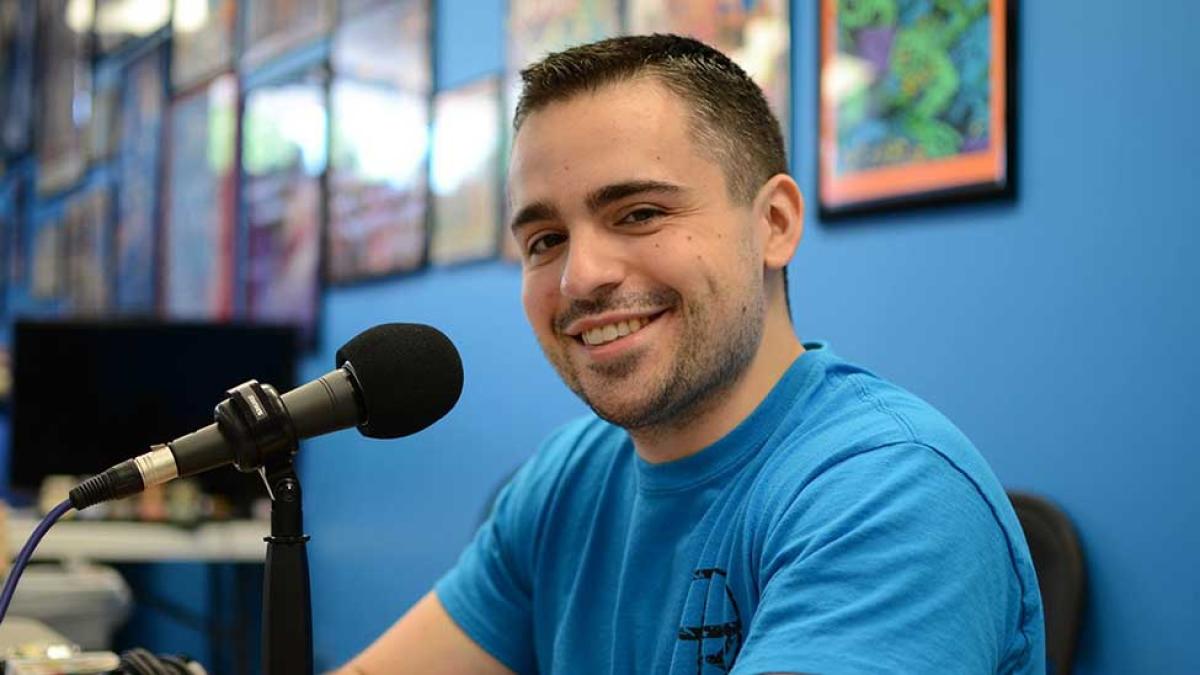
Anthony Desiato is a 2012 Haub Law Alumnus, former Director of JD Admissions and current Manager of Assessment and Advising at Haub Law, comic book and superhero aficionado, filmmaker, podcaster, husband, father, and more.
Can you briefly describe your journey to law school?
I started right after undergrad at Fordham, and I arrived at law school with a general interest in Intellectual Property, but no specific plans about what I might want to do with my degree.
Why did you choose Haub Law?
This is going to sound like I'm in Admissions mode, but the honest truth is that I came to visit for Admitted Student Day and just felt that it was the right atmosphere for me. The environment very much defied my expectations of what I thought law school would be like – stuffy, competitive, etc. It seemed like a place where I would be comfortable and thrive, and I'm happy to report that I was right.
As a student, what was one of your most memorable experiences while at Haub Law?
Law review is definitely among my most memorable experiences. If I am being honest, a classmate sort of roped me into trying out, and I don't think I fully appreciated what a commitment it would be. It was a somewhat grueling, but ultimately worthwhile, endeavor, and I was a wiz at research and citation by the end of it.
Did you always envision an alternative career to the traditional practice of law upon graduating?
I did not originally envision a career at Haub Law as a student. However, shortly after graduating in May 2012, I started making videos for the administration on a freelance basis. Then, that fall, a full-time position in Admissions became available. Since graduation, I had been in the admissions department, most recently as the Director of JD Admissions, however, I recently started a new role at the Law School as Manager of Assessment and Advising.
Switching gears a bit, how did your comic book interest develop?
My comic book fan "origin story" occurred in the winter of 1992, when a window display at a store in the White Plains Galleria caught my eye. They were advertising the landmark "Death of Superman" storyline. My parents bought it for me, and comics have been a major part of my life ever since.
Who is your favorite “superhero” and why?
Superman, always. At the most fundamental level, I have always been drawn to that character because, unlike many other superheroes, Superman is not driven by guilt or revenge. He is just someone trying to do the right thing because of the values his adoptive parents instilled in him.
You also are a filmmaker, can you talk about the documentaries you have done?
During the summer after my 1L year, I found myself in need of a creative outlet and decided to grab a camera and film a documentary about my local comic shop, where I had worked for many years. It really awakened a calling in me, and I fell in love with filmmaking and nonfiction storytelling generally. I followed that up with two more human interest stories, one about a flea market vendor and another about an aspiring puppeteer. Most recently, I Kickstarted a film called My Comic Shop Country, which secured distribution in early 2020 and is currently available on Amazon, Apple TV, and Curiosity Stream. While the subject matter is comics retail, the film really taps into larger themes about perseverance and community.
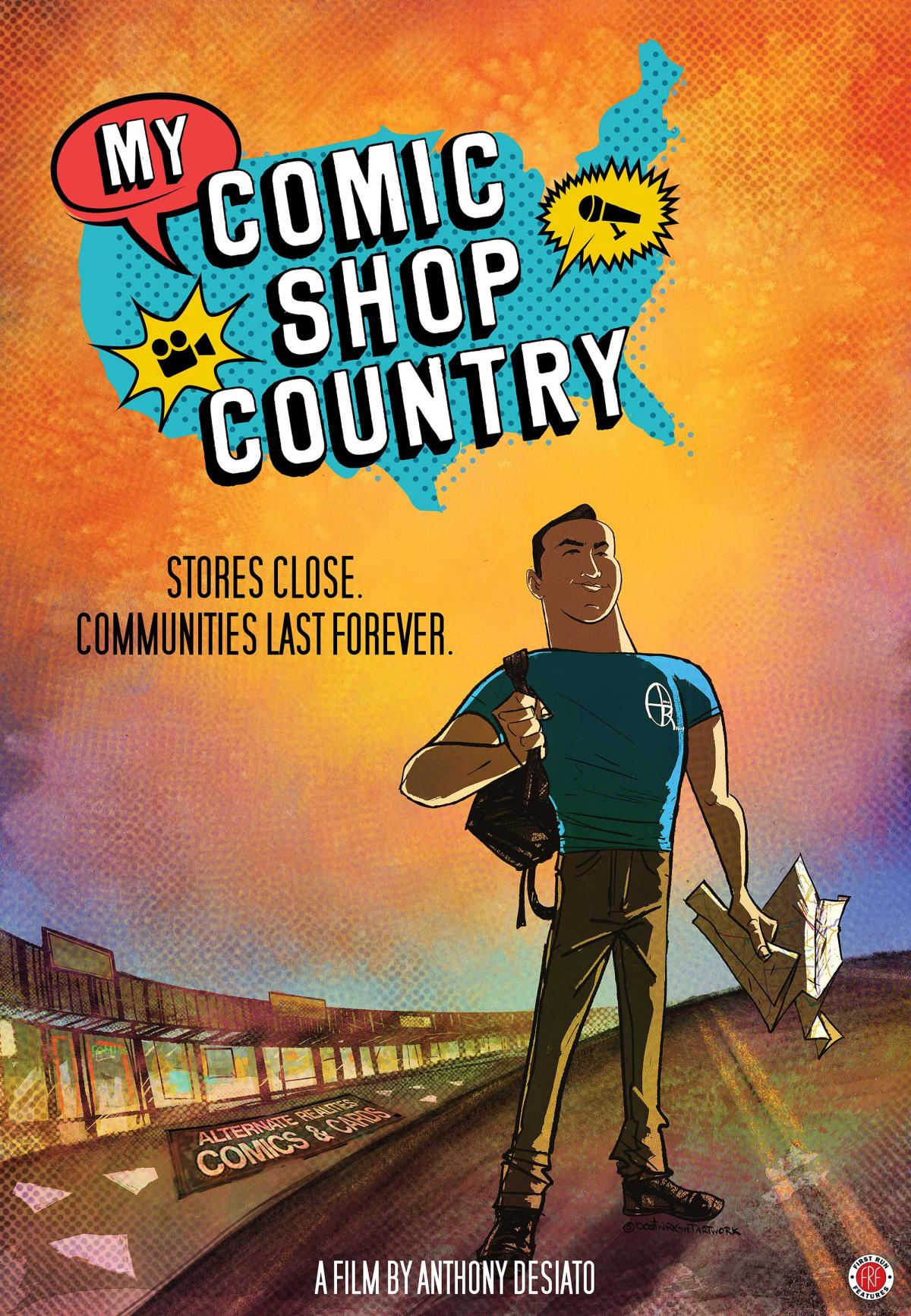
And, how did your podcasts evolve?
Once again, my local comic shop proved to be the inspiration I needed. When the owner decided to close in 2015, I started a podcast called My Comic Shop History to chronicle the final days and relive the store's most memorable moments. I continued the show with looks at collecting behavior, conventions, and more. I cannot put into words how much I have enjoyed the art of podcasting; whether you are recording in person or remotely, there is a sense of connection during the recordings that is very powerful. I think that is why podcasts in general have caught on in such a major way. They are available on all of the major podcast platforms and I have been told that they really help pass a commute!
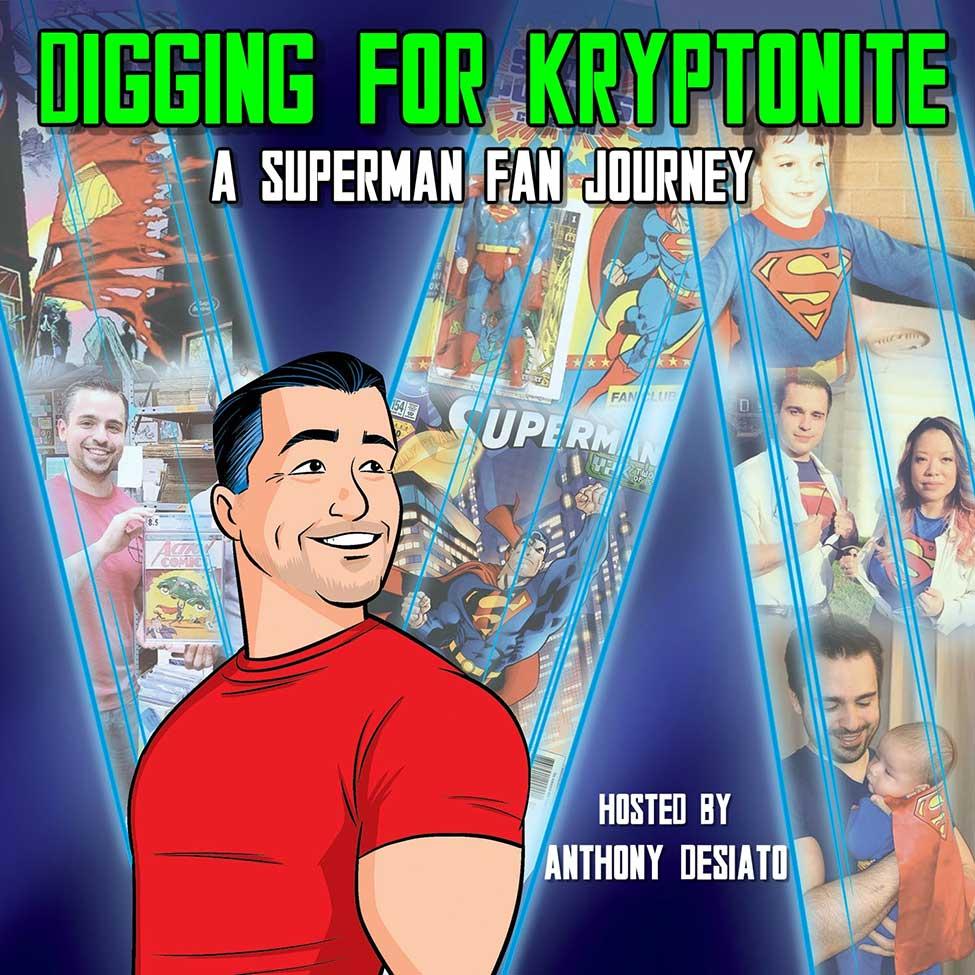
What is next as far as a documentary or more podcasts?
I do have plans for my fifth documentary, though the pandemic has me in a bit of a holding pattern right now. Podcasting has been keeping me busy, though! I have launched two new ongoing series: the Superman-centric Digging for Kryptonite as well as My Comic Shop Book Club.
What are you favorite ways to spend your time outside of work?
Spending time with my wife and son, which I have gotten to do quite a lot of over the past year! During normal times, we enjoy going to the movies, trying new restaurants, and traveling.
Pace Land Use Law Center Hosts 21st Annual Alfred B. DelBello Land Use and Sustainable Development Conference Recognizing Distinguished Professor John Nolon’s Sweeping Impact on Land Use Law
On Thursday, December 8, the Elisabeth Haub School of Law at Pace University hosted the 21st annual Alfred B. DelBello Land Use and Sustainable Development Conference. This year’s conference theme was Land Use Under Siege: Revisiting Well Grounded. Additionally, as part of a pre-conference Reception, the Center honored three individuals, including Professor John Nolon, at their Founder’s Award Reception.
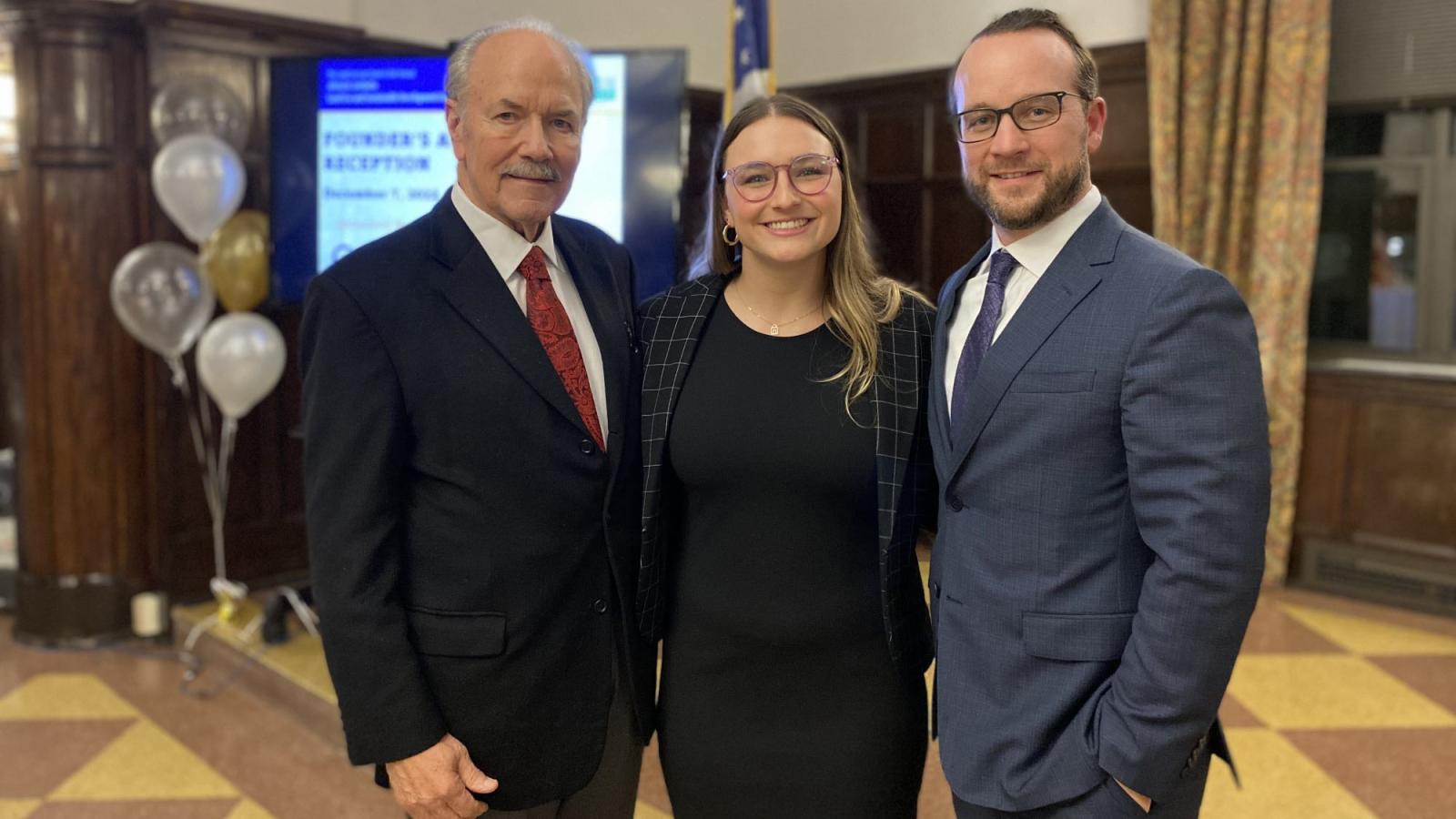
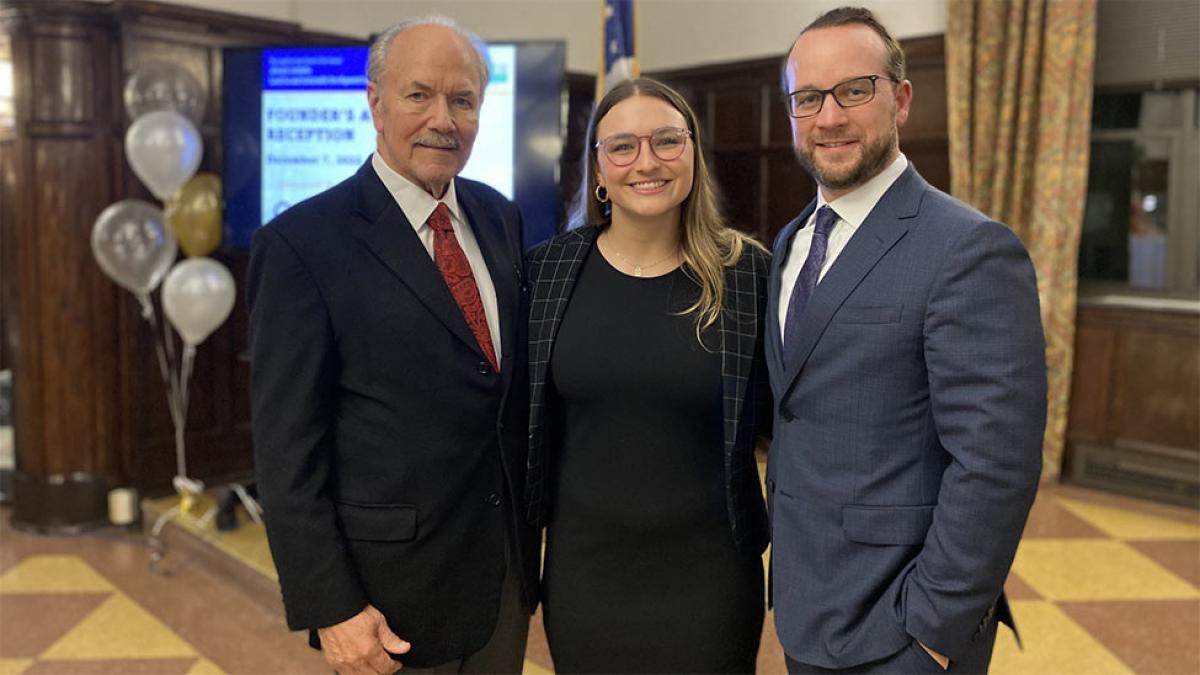
On Thursday, December 8, the Elisabeth Haub School of Law at Pace University hosted the 21st annual Alfred B. DelBello Land Use and Sustainable Development Conference. This year’s conference theme was Land Use Under Siege: Revisiting Well Grounded. Additionally, as part of a pre-conference Reception, the Center honored three individuals, including Professor John Nolon, at their Founder’s Award Reception.
The Founder’s Award Reception, held the evening before the annual conference provides a platform to recognize a current Haub Law student, a Haub Law alumni, and an individual or municipality. This year, Taylor M. Palmer '12, a partner with Cuddy & Feder LLP and a Haub Law alumnus, was the recipient of the Distinguished Young Attorney Award, as a result of his ongoing close work with the Land Use Law Center and continued commitment to land use law. Current Haub Law student Bailey Andree was selected as the recipient of the inaugural Professor John R. Nolon Student Achievement Award for her dedication and commitment to excellence in fulfilling the mission of the Land Use Law Center. These significant awards were presented by Paul Beyer, State Director of Smart Growth, NYS Department of State and Noam Bramson, Mayor, City of New Rochelle. In his remarks, Mayor Bramson gave specific examples of the significant impact Professor Nolon and the Land Use Law Center have had on the Hudson Valley. He noted that Professor Nolon’s and the Center’s guidance has allowed for the sensical design and operation of numerous urban centers, which resulted in improvements to the environment, strengthened economies, an enrichment in quality of life, and a positive reflection of values.
Finally, Professor John R. Nolon was honored with the Founder’s Award in recognition of his lifetime career of working collaboratively with a numerous communities and continued ability to foster positive change. The award was presented by Jessica Bacher, Executive Director, Land Use Law Center, and Tiffany Zezula, Deputy Director, Land Use Law Center, who both expressed their gratitude for Professor Nolon’s visionary leadership, guidance and mentorship throughout the years. Both Jessica and Tiffany fondly recalled how Professor Nolon would so effortlessly apply his mediation skills, calming down a client or rewarding a student or staff member with his token treat, a Butterfinger, which was always on hand during meetings. “There’s a true art in mediation, in bringing people together, and John is the leader in it,” they said. “John is the one who truly molded us and so many others to develop their land use talents.”
Each year, the Annual Land Use and Sustainable Development Conference brings together hundreds of attorneys, business professionals, academics, and local leaders to learn about national, regional, and local innovations and best practices. These thought leaders and policy makers convene to confront the challenges that are faced in land use. This year’s conference theme, explored the aspirational work of Professor John Nolon and the necessity for a new approach to properly using local land use law, all through a series of innovative and interesting sessions, panels, and lectures.
“Professor John Nolon’s life’s work provided the platform for this year’s annual conference – which both explored the necessity of a new approach to properly using local land use law while also recognizing and honoring the groundbreaking research and work of Professor John Nolon,” said Dean Horace Anderson. “Since founding the Land Use Law Center in 1993, Professor Nolon has fostered the development of sustainable communities and regions through the promotion of innovative land use strategies and dispute resolution techniques. Professor Nolon has developed a prolific body of work and Haub Law and the Land Use Law Center are proud to both recognize and honor him.”
This year’s conference featured numerous panels exploring the history of land use law, the evolution of land use law, and notably, land use law experts explored changes in land use and related regulations since the founding of the Land Use Law Center in 1993. The development of the varied and numerous land use laws along with examples of how current zoning and land use regulations are redefining the planning paradigms of the second half of the 20th century was explored as well. Each panel and session touched on the significance of Professor Nolon’s research, work, and contributions to the development of land use law and its future. The morning portion of the conference also featured sessions on ethics, along with breakout sessions focused on innovations in disaster mitigation and planning.
During the conference, Distinguished Professor John Nolon himself delivered an inspirational keynote address on Local Land Use Law Under Siege: Choosing to Succeed. Professor Nolon detailed the state of land use law at the time of the Land Use Law’s founding in 1993 and how it has evolved since then, to the present. During his keynote, Professor Nolon recognized the COVID-19 pandemic, the housing crisis, equity disparities, and climate disasters as contributors to the shaky state of local land use law, resolving and demonstrating how we can move beyond these crises to a more grounded state.
For the Groundbreaker’s Award Presentation, Touro University Provost (Graduate and Professional Divisions), Senior VP, Academic Affairs, and Professor of Law, Professor Patricia E. Salkin, who is also a land use law expert, academic, and long-time scholarly collaborator and friend of Professor Nolon’s detailed The Contributions of Professor John R. Nolon in a Nutshell. Together, Professor Nolon and Professor Salkin have authored several scholarly articles, casebooks, and nutshells together. Professor Salkin detailed Professor’s impressive career and contributions, as a Fulbright Scholar, his scholarly impact through his numerous books and articles, the thousands of students he has taught at not only Haub Law, but Yale and Columbia, and the broad impact his work has had on the courts, legislation, and beyond. Professor Salkin concluded her touching presentation by noting that “communities across the world are better off because of John Nolon.”
The conference continued with a final two afternoon sessions, including one on Meeting Local Housing Needs and the other a law update on Land Use and Sustainable Development: Cases and Materials, based on the textbook of which Professor Nolon is a co-author. The full-day conference wrapped up with a touching baseball themed reception in honor of John Nolon and his love of the Yankees.
John R. Nolon is Distinguished Professor of Law Emeritus at the Elisabeth Haub School of Law at Pace University where he supervises student research and publications regarding land use, sustainable development, climate change, housing insecurity, racial inequity, and the coronavirus pandemic. He is Co-counsel to the Law School's Land Use Law Center, which he founded in 1993. He served as Adjunct Professor of land use law and policy at the Yale School of the Environment from 2001-2016. Before he joined the law school faculty, he founded and directed the Housing Action Counsel to foster the development of affordable housing. He is co-author of the nation's oldest casebook on land use law: Land Use and Sustainable Development Law: Cases and Materials, currently in its ninth edition. He published nearly 50 articles in the New York Law Journal and over 60 law review articles on various aspects of land use and sustainable development law. An anthology of seven of his articles was published in 2006 as a special issue of the Pace Environmental Law Review. He has produced fifteen books (and counting) on the topics of land use law, open space protection, local environmental law, managing climate change, and the mitigation of damage caused by natural disasters. His current research focusses on the management of climate change through a strategy known as Climate Resilient Development on which he is working with over 40 Haub land use students.
The Land Use Law Center
Established in 1993, the Land Use Law Center at the Elisabeth Haub School of Law at Pace University is dedicated to fostering the development of sustainable communities through the promotion of innovative land use strategies and collaborative decision-making techniques, as well as leadership training, research, education, and technical assistance. Through its many programs, the Center offers municipalities, land use leaders, citizens, advocates, planners, attorneys, real estate industry leaders, and other land use professionals assistance that enables them to achieve their development and conservation goals. Its activities provide opportunities for students of the Elisabeth Haub School of Law at Pace University to gain in-depth, practical experience that allows them to become practice-ready attorneys serving private, public, and non-governmental clients. The Land Use Law Center is the preeminent center of its kind offering extensive research and consulting services; conferences, seminars, and clinics; law school courses; practitioner and citizen-leader training programs; continuing legal education programs; multimedia resources; and frequent publications on sustainable land use and community development.
Haub Law Names Inaugural LLM Sustainable Business Law Fellow and Faculty Director
Haub Law announces Barbara Ballan has been named the inaugural LLM Sustainable Business Law Fellow of Haub Law’s newly launched Sustainable Business Law Hub.
New Adventures and Business Ventures
Lubin international student Sara Puccitelli '25 is not only double majoring in Entrepreneurship and Economics, she also dedicates her time to helping other students learn new languages. On top of that, Sara started a business with her father to help bring tourists to New York City.
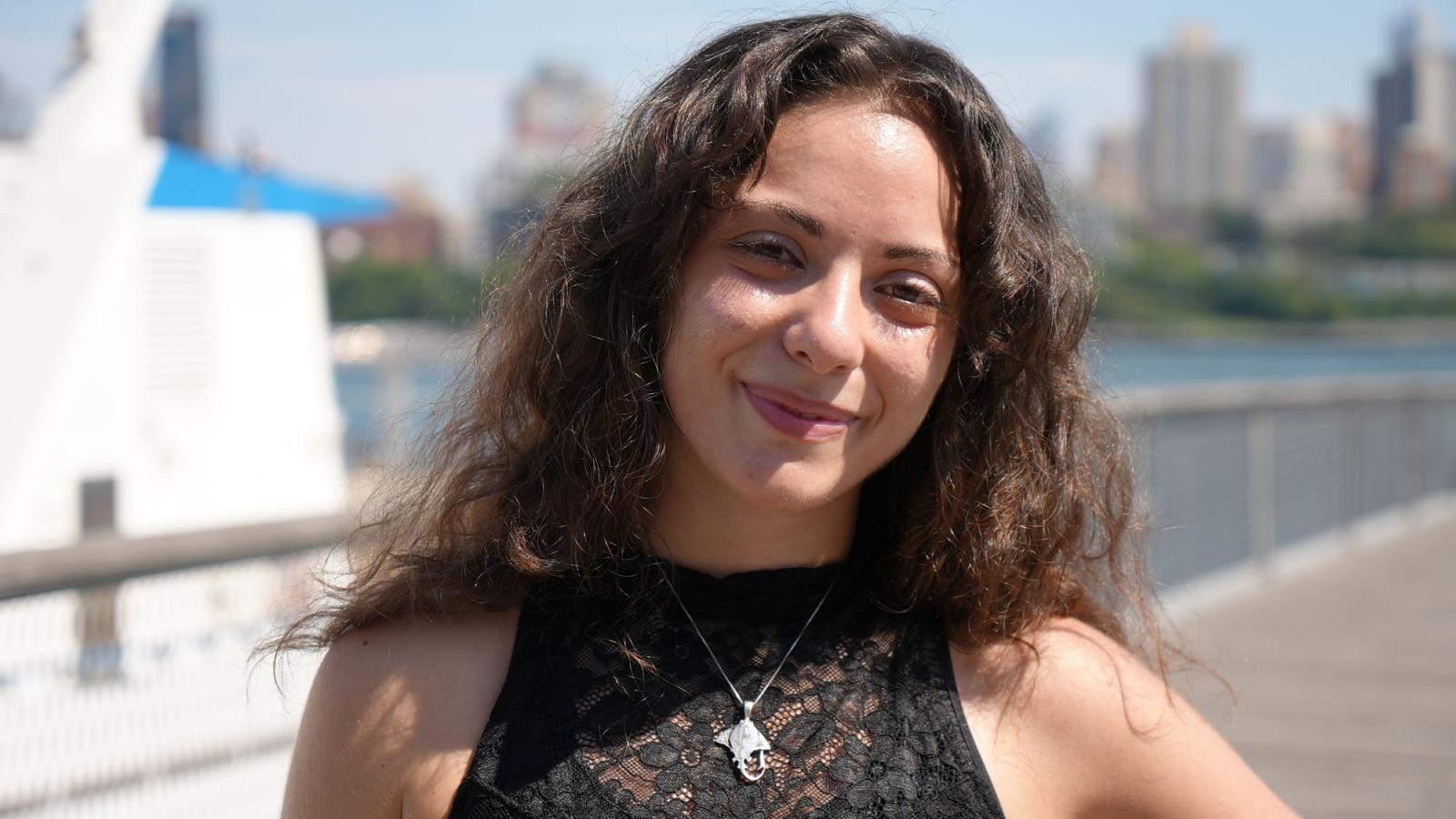
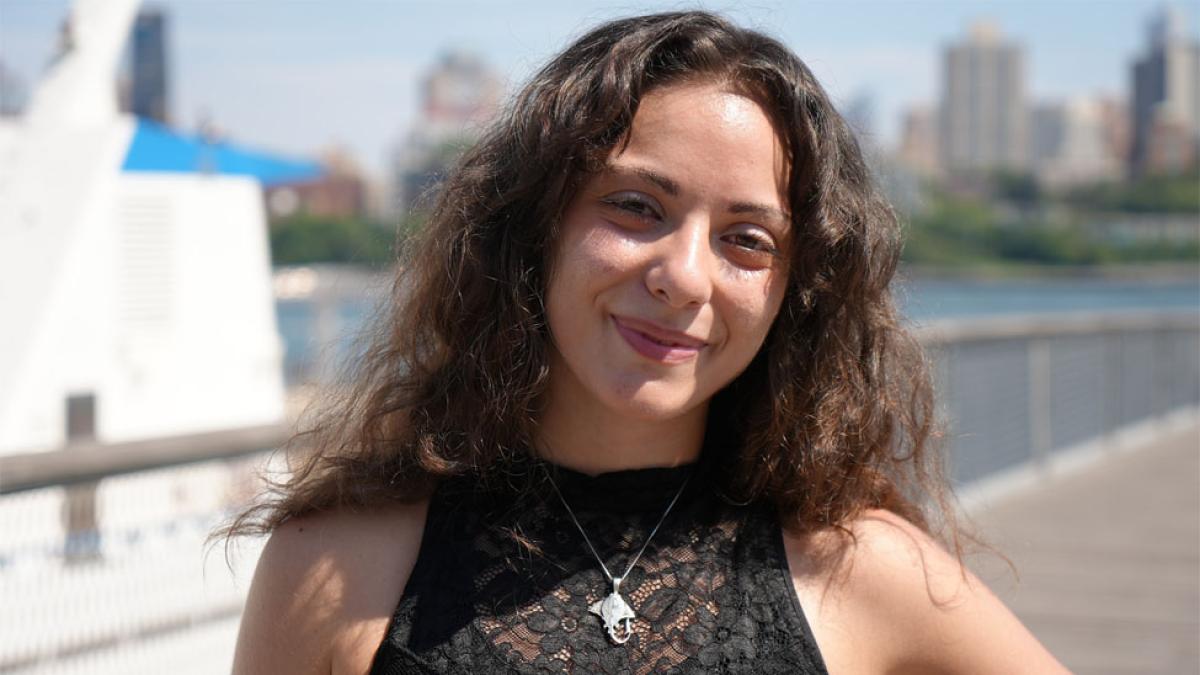
Sara Puccitelli
Class of 2025
Currently Studying: BBA in Entrepreneurship and BA in Economics (double major)
Pronouns: She/Her/Hers
Starting college in a new country is never easy, but international student Sara Puccitelli is going all in at the Lubin School of Business. Not only is she double majoring in Entrepreneurship and Economics, but she also dedicates her time to helping other students learn new languages. On top of that, Sara started a business with her father to help bring tourists to New York City.
Why did you choose Pace University and the Lubin School of Business?
I chose Pace University because I was looking for a university in New York that could provide me with knowledge to start my own business. I read about Pace and I immediately liked it. Plus, I really love where the University is located—it is near every subway line, and the view of the Brooklyn Bridge is wonderful.
Tell us a bit about being an international student at Pace.
Being an international student a Pace is not hard. It was easy to apply, and tutors and advisors always have helped me.
You started a travel agency with your dad. Tell us about your business and other ventures you're exploring.
I started a travel agency with my dad to help bring tourists—specifically Italian tourists—to New York City. We want to help them visit and participate in sports and events here, like the NYC Marathon. We create customized plans for tourists, which include flights, hotels, and either tours or sporting events. I am also starting a new business, Pucci's Crescia. My plan is to make crescia, an Italian snack similar to pizza, stuffed with meats and cheeses of choice and deliver it in the NYC area.
The Lubin School of Business has been really helpful when it comes to running my two new businesses. Thanks to what I have learned, I was able to make business and financial plans by myself. As I keep studying at Pace, I continue to learn new skills every day and find important resources on how to manage my businesses.
How have the skills and concepts you learned within the Lubin School of Business helped you run your businesses?
The Lubin School of Business has been really helpful when it comes to running my two new businesses. Thanks to what I have learned, I was able to make business and financial plans by myself. As I keep studying at Pace, I continue to learn new skills every day and find important resources on how to manage my businesses.
You also tutor other Pace students in Italian, French, and Spanish. What motivates you to help other students?
I had a friend who was always asking me questions about her Italian homework, so I decided to apply to become a tutor to help other students with the same problems I had while studying different languages. Italian is my native language, so I had to learn Spanish and French. I noticed that most students learning those languages are—for the most part—facing the same problems I had. It makes me feel good to help them.
What has been your favorite opportunity at Pace?
There are a lot of different clubs to join at Pace. I am also a dancer so having the opportunity to share my passion with other students has been great. There are also clubs related to my majors, which help me understand how to apply what I am studying in real life.
Do you have any advice for other Lubin students?
Listen and learn as much as possible. Lubin professors have a lot of experience in what they teach, so learning from them is extremely worth it. If you are having problems understanding something, or if you just want their opinion on a topic, you can reach out to them. Do not be scared or shy to reach out because they are here to help.
What does #LubinLife mean to you?
#LubinLife means friendship and opportunity. I met two of my closest friends at Pace. #LubinLife means meeting people with business mindsets, which makes it easier to share and discover new ideas. People are willing to support you, and with Lubin located in a city like New York, you will have access to the best resources, which will definitely help you succeed.
Connect with Sara:
Sara S. Price '08: From Behind the Bench
Haub Law alumna Sara Price grew up in Larchmont, fifteen minutes from the Elisabeth Haub School of Law Campus. Coupled with the fact that her mother, Elaine Price, attended Haub Law, she was familiar with the law school long before becoming a student there.
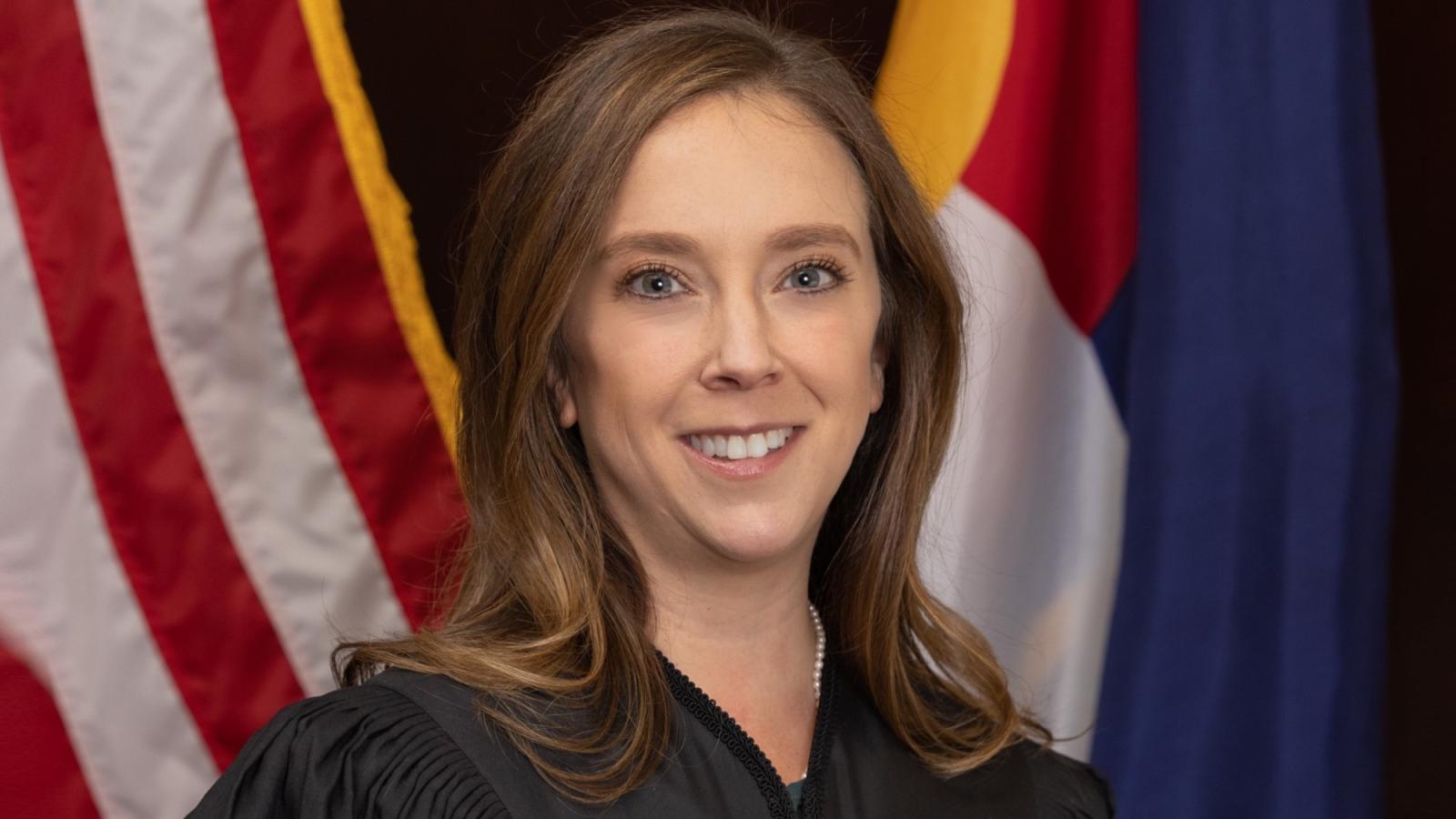
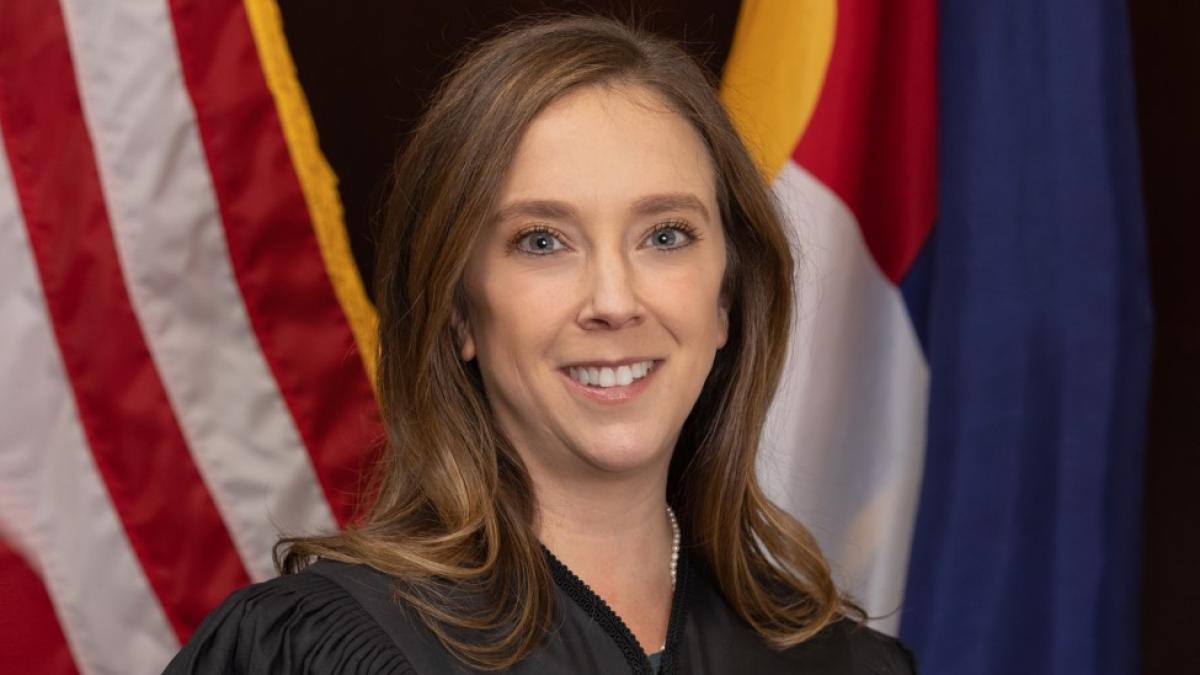
Haub Law alumna Sara Price grew up in Larchmont, fifteen minutes from the Elisabeth Haub School of Law Campus. Coupled with the fact that her mother, Elaine Price, attended Haub Law, she was familiar with the law school long before becoming a student there. “As an undergraduate student at the University of New Hampshire, I fell in love with environmental policy and sustainable urban development. After taking an Environmental Law and Policy class in college, I decided I wanted to study environmental law and one day head the Environmental Protection Agency. That’s how I ended up at Pace. I knew about the environmental law program initially because of my mother, but the more I researched the breadth of it, the more I knew it was a perfect fit for me,” said Sara.
Once she was at Pace, Sara had a very positive experience. “I really liked all my professors, and I could talk a lot about them. Professor Cassuto was incredible; his Animal Law class really opened my eyes to issues I had never previously thought about. Professor Crawford deserves a medal for making tax law interesting, accessible, and fun. Thanks to Professor Gershman I developed a love for criminal law, and I can’t think of prison reform without thinking of Professor Mushlin.”
After graduating from law school, Sara had spent over 20 years in Westchester and wanted a change. “I had spent some time visiting friends in Colorado and felt that it would be a good fit for me. I moved to Denver right after graduation, studied for the bar and struggled through the recession like the rest of us new lawyers at that time. I began an internship with a Judge which turned into a clerkship. As soon as I started my internship at the court, something clicked and I knew my place was in the courtroom. It was then I knew my path was to the bench.”
Today, Sara is a Magistrate Judge for the 17th Judicial District in Colorado. “One thing I love about my job is that the day to day is always changing. Primarily I have a probate docket so I’m conducting hearings related to estates, trusts, guardianships and conservatorships. I also conduct protection order hearings and non-contested divorces. I rule on all the motions filed in the probate cases, I also get to review, and sign arrest warrants. Finally, we have a really great team of Magistrates in the 17th Judicial District so we’re always training in other divisions so that we can cover for each other.”
While Sara learned early in her career that her place was in the courtroom, she did not necessarily know that it would be in her current capacity as a Magistrate Judge, but she felt very prepared for it based on the variety of experiences she opened herself up to prior to that point. “My advice for current students would be to not pigeonhole yourself to a certain area or practice and to learn with an open mind. If you start studying something that piques your interest, lean into it. Everyone has a different path and what you learn along the way is going to be helpful in ways that you could never anticipate. Pace helped shape my career path because it opened my eyes to all the possibilities that come with a law degree. The law is such a big field and as an attorney your opportunities are endless."
Pace helped shape my career path because it opened my eyes to all the possibilities that come with a law degree. The law is such a big field and as an attorney your opportunities are endless.
When Sara is not behind the bench, you can find her running, paddle boarding, playing tennis, traveling, and enjoying all that Colorado has to offer.
‘Nightmare’ Warehouse Fire Erases Evidence in Many Unsolved Cases
Adjunct Professor Debra Cohen spoke with The New York Times regarding the massive fire that took place at a Police Department warehouse in Brooklyn, erasing decades of evidence for cases that ranged from reckless driving to murders and cold cases.
